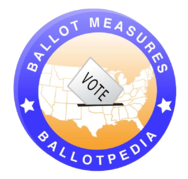National Ballot Access
| Petition Companies |
|---|

|
National Ballot Access is a company that offers signature gathering services to ballot initiative campaigns.
About
National Ballot Access (NBA) was founded in 2007 in Lawrenceville, Georgia, and operates in all 50 states. NBA works on ballot initiatives, veto referendums, and recall efforts. NBA utilizes volunteers and paid activists.[1] According to the Georgia Corporations Division as of 2015, National Ballot Access (NBA) listed the registered agent as Kim Davis, E. Mary Baggett as the CEO and Heidi Verougstraete as the CFO and secretary.[2]
Petition drives
The following ballot measures appeared on the ballot after the sponsoring campaign committee hired National Ballot Access to collect signatures. Since 2016, nine ballot measures appeared on the ballot after the sponsoring committee(s) hired National Ballot Access to gather signatures. Of the nine measures that appeared on the ballot, seven were approved and two were defeated. Sponsoring committees paid an average of $811,212.53 in total for National Ballot Access' signature gathering services per ballot measure.
Measures on the ballot (2016-2021)
| Year | Measure | Measure description | Total cost | Signatures required | CPRS | Outcome |
|---|---|---|---|---|---|---|
| 2016 | Arkansas Issue 6 | Legalize medical marijuana | $588,166.35 | 84,859 | $6.93 | |
| 2016 | Missouri Amendment 2 | Regulations on campaign contributions | $1,064,338.99 | 157,788 | $6.75 | |
| 2018 | Arkansas Issue 4 | Authorizes four new casinos in specific counties to specific licensees | $1,416,481.70 | 84,859 | $16.69 | |
| 2018 | Arkansas Issue 5 | Increases the state's minimum wage to $11 per hour by 2021 | $510,946.70 | 67,887 | $7.53 | |
| 2018 | Missouri Amendment 3 | Legalizes marijuana for medical purposes | $1,266,514.04 | 160,199 | $7.91 | |
| 2019 | Washington Referendum 88 | Upholds or rejects the legislature's approval of Initiative 1000, which authorizes affirmative action by the state | $837,177.88 | 259,622 | $3.22 | |
| 2020 | Nebraska Initiative 429 | Changes the constitution to allow statutes authorizing games of chance at licensed racetracks | $679,260.60 | 122,274 | $5.56 | |
| 2020 | Nebraska Initiative 430 | Authorizes games of chance at licensed racetracks and establishes a governing commission | $469,013.27 | 85,628 | $5.48 | |
| 2020 | Nebraska Initiative 431 | Enacts a tax on any games of chance operated at racetracks | $469,013.27 | 85,628 | $5.48 |
This chart was last updated after statewide ballot measure elections in 2021.
Ballot initiative signature costs
The cost of getting an initiative before voters varies widely by state and by initiative proposal. The requirements and restrictions imposed by state law form a major factor in the expense of an initiative signature petition effort.
Higher signature requirements are a straightforward example of a reason an initiative petition campaign might be more expensive in one state than in another. Other restrictions that can make a difference in the cost of a petition campaign include:
- Distribution requirements - It is easier and less expensive to collect a lot of signatures in one very populous area than a small number of signatures from lots of smaller, less-populated areas.
- Pay-per-signature bans - Paying signature gatherers by signature is one of the most cost-efficient ways to fund signature gathering efforts.
- Restrictions on circulators - Restricting who can collect signatures limits competition between petition companies and professional signature gatherers.
- Initiative petition circulation periods - If proponents have less time to collect signatures, the process can be more expensive.
Measuring the cost
Ballotpedia uses two ways to measure the cost of an initiative or veto referendum petition drive.
- According to the total cost of gathering the required signatures to put the initiative or veto referendum on the ballot
- According to the total cost divided by the number of signatures required to qualify the measure for the ballot or Cost Per Required Signature (CPRS)
Total cost: The total cost depends on all of the factors that can make a petition effort more or less expensive, including the population of the state and the state's signature requirements. This measurement does not necessarily indicate how difficult it is to run a signature petition campaign in a state relative to other states or how hard and expensive it is to collect a given valid signature. It takes into consideration the population and signature requirements for a state. For example, the average total cost of a successful initiative petition drive in California in 2016 was just over $2.9 million, while in Oklahoma the average total cost was about $870,000. Initiatives in California, however, require over four times as many signatures and affect 10 times as many people.
Cost Per Required Signature (CPRS): The cost per required signature cuts out the variable of a state's signature requirements and shows the cost for each signature needed to qualify the measure for the ballot. This second measurement is a better indication of how difficult it is to run a signature petition campaign in a given state relative to other states. For example, the average CPRS in California in 2016 was $6.20 while the average CPRS in Oklahoma was $9.59, but the average total petition cost was $2.9 million in California and about $870,000 in Oklahoma.
From the perspective of a national organization or proponents of a national agenda, this means that a lower CPRS generally means that a campaign could potentially affect more people and achieve more political influence per dollar spent, while the total petition cost might dictate in which states the campaign could actually afford to launch a successful petition drive.
Recent news
The link below is to the most recent stories in a Google news search for the terms National Ballot Access. These results are automatically generated from Google. Ballotpedia does not curate or endorse these articles.
See also
- Edee Baggett
- Heidi Verougstraete
- Ballot initiative
- Veto referendum
- Election recalls
- Petition drive
- Ballot measures cost per required signatures analysis
- Signature requirements for ballot measures
- Initiative petition signature validity rates
- Initiative petition circulation periods
External links
Footnotes
Signature requirements | |
|---|---|
| Signature requirements |
Alabama • Alaska • Arizona • Arkansas • California • Colorado • Connecticut • Delaware • Florida • Georgia • Hawaii • Idaho • Illinois • Indiana • Iowa • Kansas • Kentucky • Louisiana • Maine • Maryland • Massachusetts • Michigan • Minnesota • Mississippi • Missouri • Montana • Nebraska • Nevada • New Hampshire • New Jersey • New Mexico • New York • North Carolina • North Dakota • Ohio • Oklahoma • Oregon • Pennsylvania • Rhode Island • South Carolina • South Dakota • Tennessee • Texas • Utah • Vermont • Virginia • Washington • West Virginia • Wisconsin • Wyoming |
| Petition companies |
American Petition Consultants • Arno Political Consultants • Bader & Associates, Inc. • Canvasser Services • Capitol Assets • Democracy Direct • Democracy Resources • Discovery Petition Management • FieldWorks • JSM, Inc. • Kimball Petition Management • LAMM Political Partners, LLC • Masterson & Wright • National Ballot Access • National Petition Management • National Solutions • National Voter Outreach • PCI Consultants, Inc. |
| Terms |
Approved for circulation • Initiative petition circulation periods • Circulator • Circulator affidavit • Forged signature • Fraudulent signature • Invalid signature • Paid circulator • Petition • Random sampling • Registered voter • Signature certification • Signer • Signer intent • Valid signature • Volunteer circulator • Signature transcription |
| Petition drive deadlines |
2008 deadlines • 2009 deadlines • 2010 deadlines • 2011 deadlines • 2012 deadlines • 2013 deadlines • 2014 deadlines • 2015 deadlines • 2016 deadlines • 2017 deadlines • 2018 deadlines • 2019 deadlines • 2020 deadlines • 2021 deadlines • 2022 deadlines • 2023 deadlines • 2024 deadlines • 2025 deadlines |
| Signature law |
States where signature requirements are based on votes cast for governor |
